Key takeaways:
- Empathy transforms workshops by fostering meaningful connections through sharing personal stories and active listening.
- Incorporating role-playing, emotional storytelling, and mindfulness practices deepens participants’ understanding of each other’s experiences.
- Creating a safe space for sharing, supported by ground rules and icebreaker activities, encourages openness and vulnerability.
- Reflective practices, such as journaling and group sharing, enhance empathy by allowing participants to connect with their emotions and experiences.
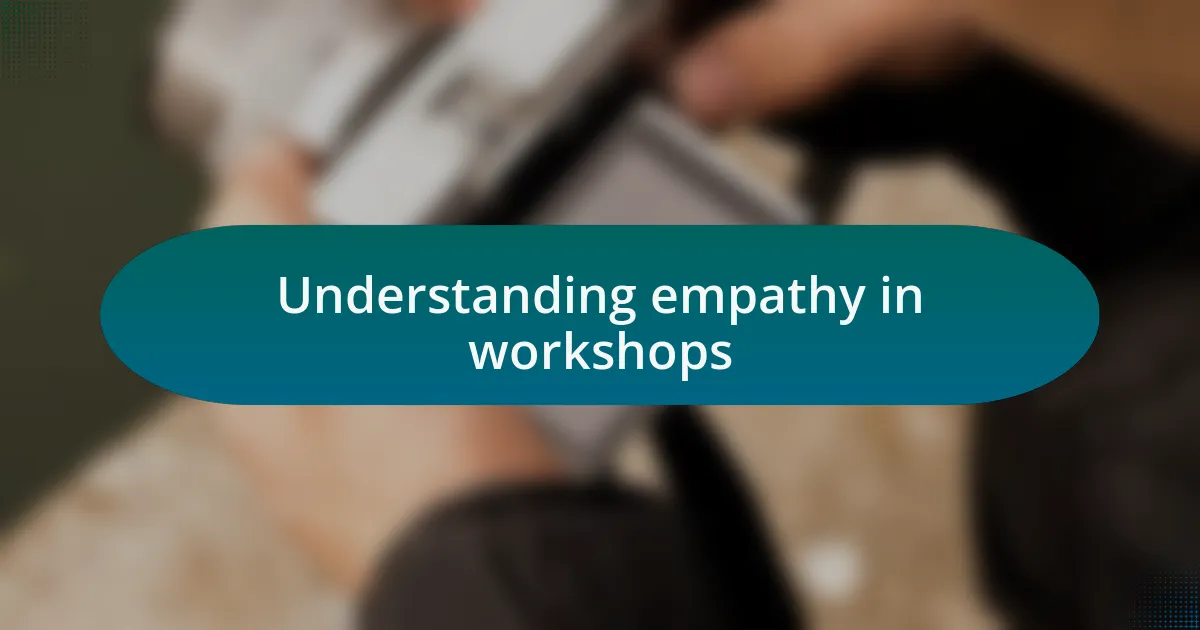
Understanding empathy in workshops
Empathy in workshops is more than just a buzzword; it’s the heartbeat of meaningful connections. I recall a workshop where participants were initially skeptical about sharing their true feelings. But when I shared a personal story about overcoming a challenge in my career, I noticed a shift. People began to open up, revealing their vulnerabilities, and suddenly, the room was brimming with shared understanding.
Have you ever felt deep empathy during a shared experience? That’s precisely what happens in workshops designed to foster this emotional connection. I’ve seen how creating a safe space encourages individuals to step outside their comfort zones and engage with their peers on a more personal level. It’s fascinating to witness how the simple act of active listening can dissolve barriers and spark authentic dialogue.
Empathy transforms a traditional workshop into a collaborative journey. For instance, during one session, I facilitated an activity where participants exchanged personal stories related to their work struggles. The impact was profound; I watched as they started to understand not just each other’s experiences but also the broader context of their own feelings. This mutual exchange cultivates a sense of community that enriches the entire learning experience.
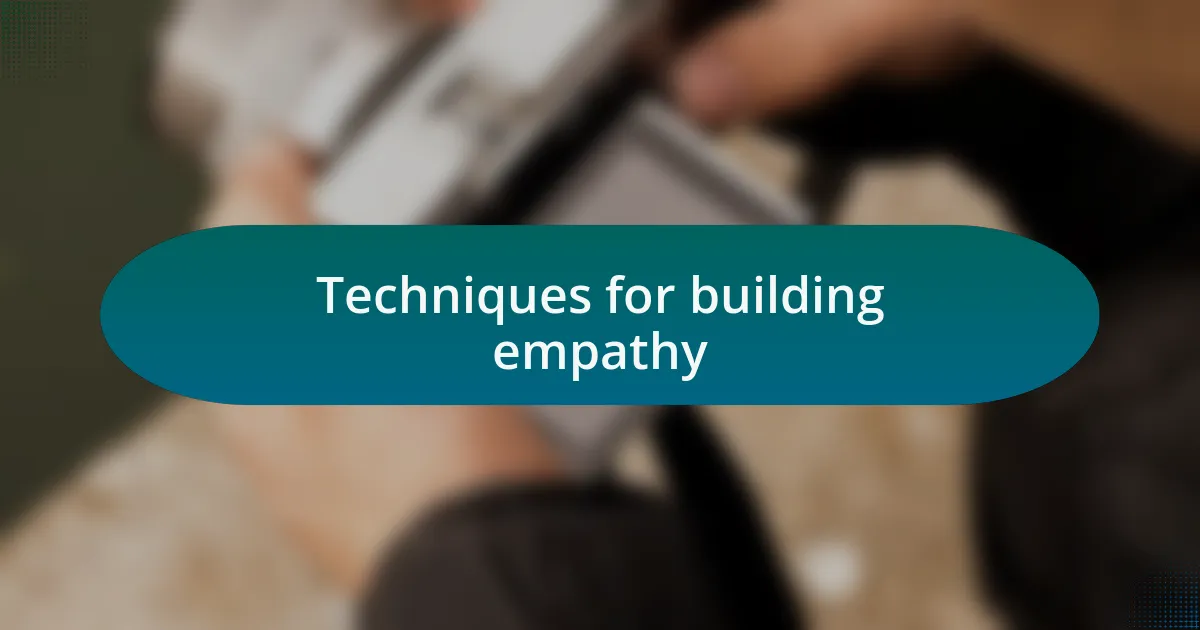
Techniques for building empathy
One effective technique for building empathy is to incorporate role-playing exercises into workshops. I remember a session where participants had to step into the shoes of a colleague facing a difficult project. As they navigated the challenges, their perspectives shifted dramatically. It was revealing to watch them grapple with the emotions involved, experiencing frustration, joy, and relief—all in a matter of minutes. How often do we truly understand what others go through without experiencing it ourselves?
Another method involves guided discussions focused on emotional storytelling. I often encourage participants to think about a time when they felt misunderstood or marginalized. When attendees share these raw moments, the intense emotions resonate deeply. I have witnessed people tearing up as they recount their struggles, leading to a powerful moment of connection. Isn’t it remarkable how sharing vulnerability fosters a sense of unity among individuals who may have seemed strangers at the beginning?
Finally, integrating mindfulness practices can subtly enhance empathy. I once started a workshop with a brief meditation, prompting participants to reflect on their feelings and those of others. This practice created a calm atmosphere that made everyone more receptive to listening and engaging. It’s an eye-opener—how often do we rush through conversations without pausing to consider the emotions at play? Mindfulness sets the stage for a deeper, more meaningful exchange, laying the groundwork for authentic understanding to flourish.
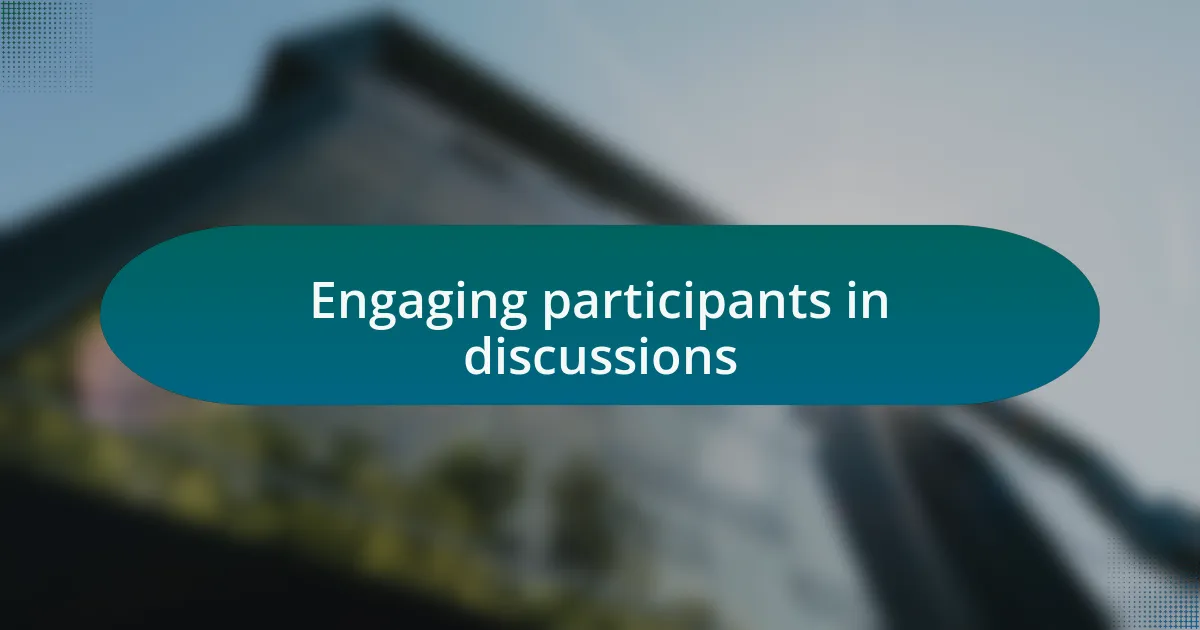
Engaging participants in discussions
Engaging participants in discussions often requires creating an environment where everyone feels safe to express their views. I recall a group discussion that took a surprising turn when I invited everyone to write down their thoughts anonymously before sharing them. The nervous energy quickly transformed into curiosity, and participants were more willing to discuss even the most sensitive topics. How freeing it was to see individuals who usually hold back suddenly animated, their insights triggering others to reflect on their own experiences.
Encouraging active listening can significantly deepen conversations. I’ve facilitated sessions where participants were tasked with summarizing each other’s viewpoints before responding. This simple technique made everyone feel valued and heard. It’s fascinating how a little extra effort in listening can shift the dynamic, fostering an atmosphere of respect. Have you ever realized how validating it feels when someone truly understands your point of view? The connection that forms in these moments can lead to richer discussions and stronger relationships.
Moreover, incorporating open-ended questions has proven to be a game-changer in stimulating dialogue. During one workshop, I prompted participants with a question that seemed straightforward: “What does empathy mean to you?” The answers varied widely, revealing personal stories and perspectives I hadn’t anticipated. It was enlightening to witness how a single question could unravel layers of thought and emotion, leading to a heartfelt exchange. Isn’t it incredible how simply asking the right question can unlock such depth?
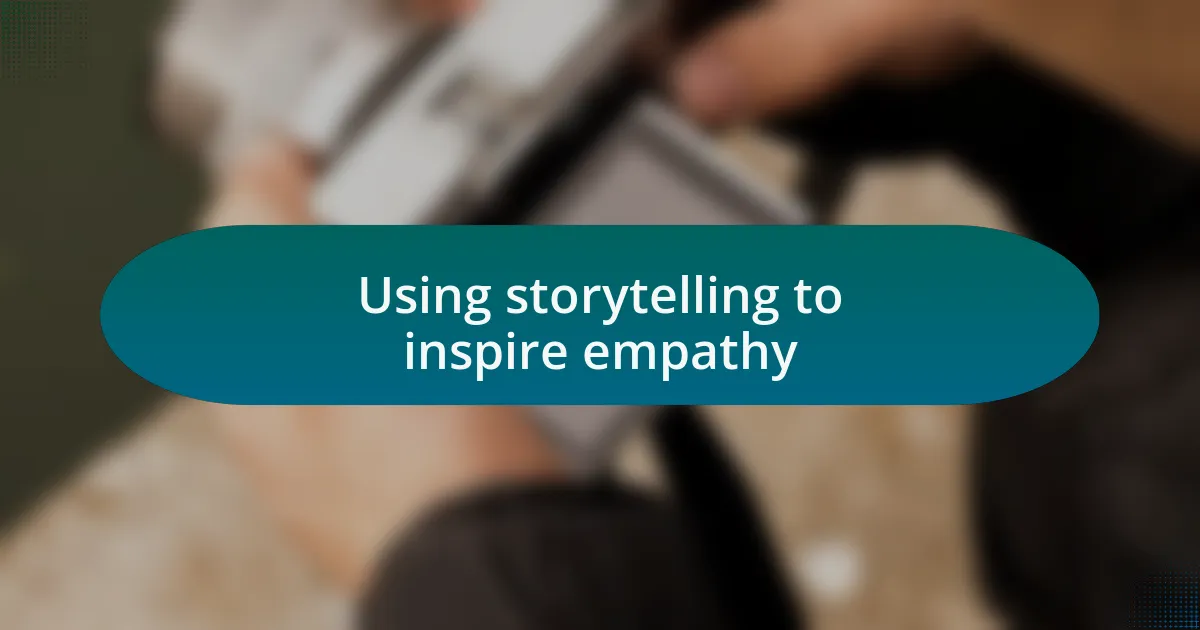
Using storytelling to inspire empathy
Using storytelling as a powerful tool in workshops can deeply resonate with participants. I remember facilitating a session where I shared a personal story about overcoming a significant challenge. As I spoke, I could see the shift in the room—faces lighting up with recognition, as people connected their own struggles with mine. It sparked a powerful moment of collective vulnerability, reminding everyone that we all face battles, even if they manifest differently.
When participants engage with stories, they often find themselves emotionally invested, which is where empathy truly flourishes. For instance, during a recent workshop, I encouraged participants to share stories that represented pivotal moments in their careers. Watching them recount these experiences, I noticed a remarkable transformation; animosities faded, and a sense of camaraderie emerged. Has there ever been a moment in your life that made you truly understand someone else’s perspective? It’s through these narratives that we begin to see the humanity in each other.
Finally, weaving in stories from diverse backgrounds can enrich the tapestry of empathy. I once shared a tale about a colleague from a different culture who faced bias in the workplace. The immediate reactions were empathetic gasps, and later, participants reflected on their own biases. By confronting these uncomfortable truths, we opened a dialogue on empathy that was not only enlightening but also essential for fostering inclusivity in the tech industry. How can we expect to grow if we don’t first understand the different experiences that shape one another?
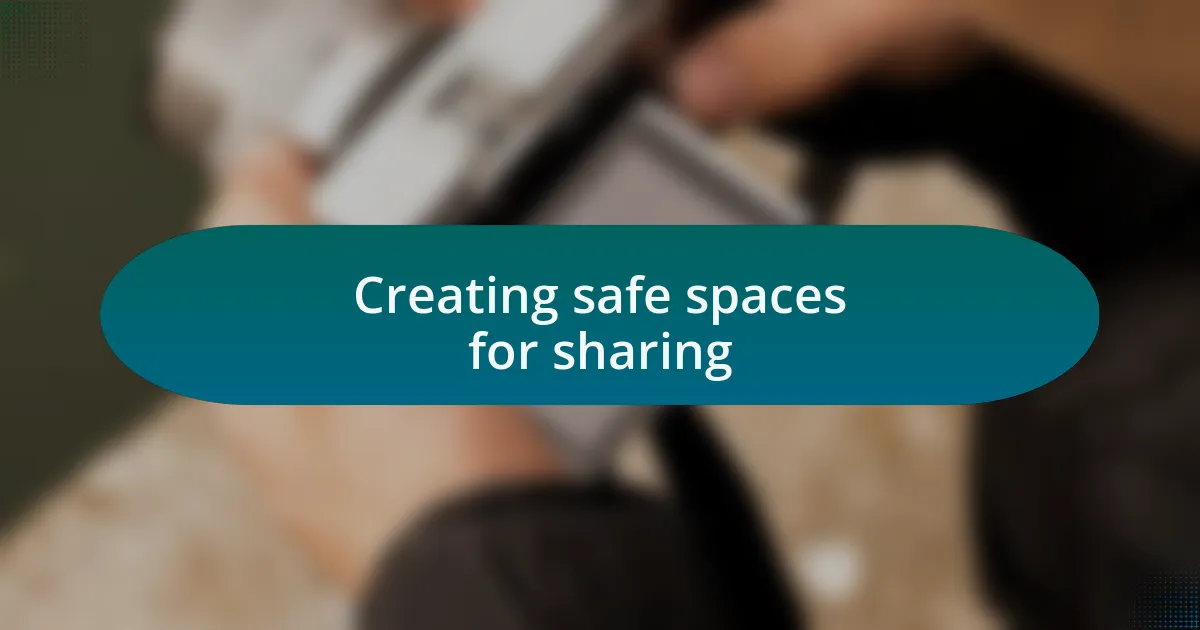
Creating safe spaces for sharing
Creating a safe space for sharing is crucial in making participants feel valued and understood. I recall a time when I set ground rules at the beginning of a workshop, emphasizing confidentiality and respect. It was remarkable to see how participants quickly opened up, feeling reassured that their voices would be heard without judgment. How often do we shy away from sharing our thoughts due to fear? Providing that space mitigates those concerns, fostering a supportive environment where everyone can express themselves freely.
Moreover, I find that incorporating icebreaker activities helps cultivate this safe environment. In one of my workshops, I paired participants for a simple exercise where they had to share a non-work-related passion. The atmosphere shifted almost instantly; laughter replaced tension, making revelations about our identities less daunting. Isn’t it fascinating how something as simple as a shared laugh can dismantle barriers? By nurturing these connections, we lay the groundwork for deeper discussions later on.
Lastly, inviting participants to set their own guidelines can be incredibly empowering. During a recent session, I asked the group what they needed from each other to feel comfortable sharing. Their suggestions ranged from using “I” statements to respecting speaking time, and it was enlightening to witness their commitment to each other’s comfort levels. Why not empower participants to take ownership of their space? This approach not only fosters empathy but also reinforces the idea that we are all responsible for creating an inclusive atmosphere.
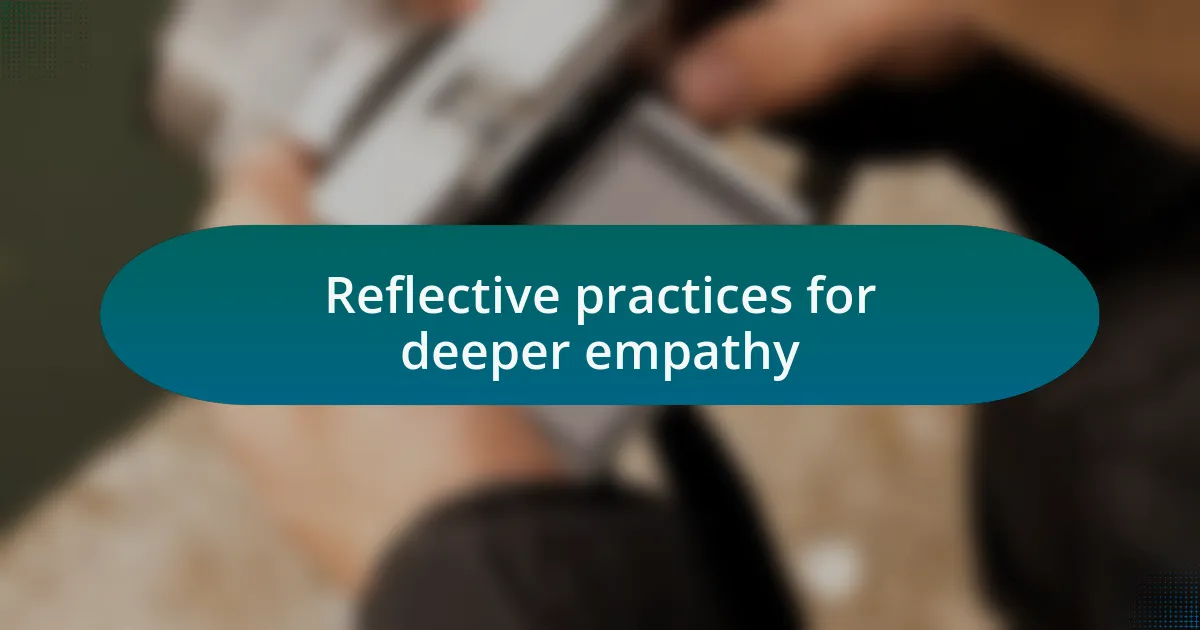
Reflective practices for deeper empathy
Reflective practices are vital for cultivating deeper empathy among workshop participants. I often incorporate journaling exercises where participants take a few moments to write about their feelings regarding a shared topic. One memorable instance was when I guided a group through reflecting on a challenging experience. The room hushed as each person wrote, and the atmosphere shifted from casual discussion to a profound connection with their emotions. Isn’t it fascinating how simply putting pen to paper can bring clarity to our thoughts and foster a collective understanding?
Another effective method I’ve utilized is group sharing of reflections. After journaling, I encourage participants to share their insights with the group. I remember a workshop where someone bravely shared their struggles with imposter syndrome, leading others to mirror those feelings. This act of vulnerability sparked a cascade of related stories, creating a network of shared experience. How often do we realize we aren’t alone in our feelings until someone else has the courage to voice them?
Furthermore, I find that engaging in mindfulness practices can enhance empathy. I’ve led sessions where we take a moment to breathe and be present, focusing on our shared humanity. In one workshop, we closed with a guided meditation centered around compassion. The calm that enveloped the room was palpable, and participants expressed a newfound understanding of each other’s journeys. Isn’t it interesting how slowing down and connecting with our breath can amplify our connections? By incorporating these reflective practices, I witness firsthand how empathy flourishes, enriching the workshop experience for everyone involved.